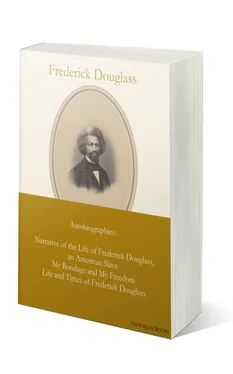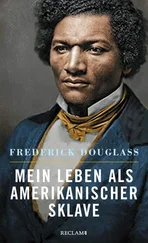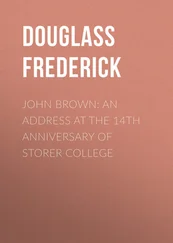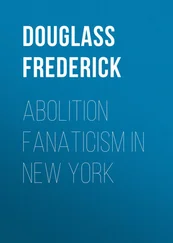Frederick Douglass - Frederick Douglass - Autobiographies
Здесь есть возможность читать онлайн «Frederick Douglass - Frederick Douglass - Autobiographies» — ознакомительный отрывок электронной книги совершенно бесплатно, а после прочтения отрывка купить полную версию. В некоторых случаях можно слушать аудио, скачать через торрент в формате fb2 и присутствует краткое содержание. Жанр: unrecognised, на немецком языке. Описание произведения, (предисловие) а так же отзывы посетителей доступны на портале библиотеки ЛибКат.
- Название:Frederick Douglass: Autobiographies
- Автор:
- Жанр:
- Год:неизвестен
- ISBN:нет данных
- Рейтинг книги:4 / 5. Голосов: 1
-
Избранное:Добавить в избранное
- Отзывы:
-
Ваша оценка:
- 80
- 1
- 2
- 3
- 4
- 5
Frederick Douglass: Autobiographies: краткое содержание, описание и аннотация
Предлагаем к чтению аннотацию, описание, краткое содержание или предисловие (зависит от того, что написал сам автор книги «Frederick Douglass: Autobiographies»). Если вы не нашли необходимую информацию о книге — напишите в комментариях, мы постараемся отыскать её.
He became the most influencal African American of the 19th century. In three very notable autobiographies he wrote about his struggles and experiences.
Frederick Douglass: Autobiographies — читать онлайн ознакомительный отрывок
Ниже представлен текст книги, разбитый по страницам. Система сохранения места последней прочитанной страницы, позволяет с удобством читать онлайн бесплатно книгу «Frederick Douglass: Autobiographies», без необходимости каждый раз заново искать на чём Вы остановились. Поставьте закладку, и сможете в любой момент перейти на страницу, на которой закончили чтение.
Интервал:
Закладка:
In connection with this, there is one circumstance which makes your recollections peculiarly valuable, and renders your early insight the more remarkable. You come from that part of the country where we are told slavery appears with its fairest features. Let us hear, then, what it is at its best estate—gaze on its bright side, if it has one; and then imagination may task her powers to add dark lines to the picture, as she travels southward to that (for the colored man) Valley of the Shadow of Death, where the Mississippi sweeps along.
Again, we have known you long, and can put the most entire confidence in your truth, candor, and sincerity. Every one who has heard you speak has felt, and, I am confident, every one who reads your book will feel, persuaded that you give them a fair specimen of the whole truth. No one-sided portrait,—no wholesale complaints,—but strict justice done, whenever individual kindliness has neutralized, for a moment, the deadly system with which it was strangely allied. You have been with us, too, some years, and can fairly compare the twilight of rights, which your race enjoy at the North, with that "noon of night" under which they labor south of Mason and Dixon's line. Tell us whether, after all, the half-free colored man of Massachusetts is worse off than the pampered slave of the rice swamps!
In reading your life, no one can say that we have unfairly picked out some rare specimens of cruelty. We know that the bitter drops, which even you have drained from the cup, are no incidental aggravations, no individual ills, but such as must mingle always and necessarily in the lot of every slave. They are the essential ingredients, not the occasional results, of the system.
After all, I shall read your book with trembling for you. Some years ago, when you were beginning to tell me your real name and birthplace, you may remember I stopped you, and preferred to remain ignorant of all. With the exception of a vague description, so I continued, till the other day, when you read me your memoirs. I hardly knew, at the time, whether to thank you or not for the sight of them, when I reflected that it was still dangerous, in Massachusetts, for honest men to tell their names! They say the fathers, in 1776, signed the Declaration of Independence with the halter about their necks. You, too, publish your declaration of freedom with danger compassing you around. In all the broad lands which the Constitution of the United States overshadows, there is no single spot,—however narrow or desolate,—where a fugitive slave can plant himself and say, "I am safe." The whole armory of Northern Law has no shield for you. I am free to say that, in your place, I should throw the MS. into the fire.
You, perhaps, may tell your story in safety, endeared as you are to so many warm hearts by rare gifts, and a still rarer devotion of them to the service of others. But it will be owing only to your labors, and the fearless efforts of those who, trampling the laws and Constitution of the country under their feet, are determined that they will "hide the outcast," and that their hearths shall be, spite of the law, an asylum for the oppressed, if, some time or other, the humblest may stand in our streets, and bear witness in safety against the cruelties of which he has been the victim.
Yet it is sad to think, that these very throbbing hearts which welcome your story, and form your best safeguard in telling it, are all beating contrary to the "statute in such case made and provided." Go on, my dear friend, till you, and those who, like you, have been saved, so as by fire, from the dark prisonhouse, shall stereotype these free, illegal pulses into statutes; and New England, cutting loose from a blood-stained Union, shall glory in being the house of refuge for the oppressed,—till we no longer merely "hide the outcast," or make a merit of standing idly by while he is hunted in our midst; but, consecrating anew the soil of the Pilgrims as an asylum for the oppressed, proclaim our welcome to the slave so loudly, that the tones shall reach every hut in the Carolinas, and make the broken-hearted bondman leap up at the thought of old Massachusetts.
God speed the day!
Till then, and ever,
Yours truly,
WENDELL PHILLIPS.
CHAPTER I.
I was born in Tuckahoe, near Hillsborough, and about twelve miles from Easton, in Talbot county, Maryland. I have no accurate knowledge of my age, never having seen any authentic record containing it. By far the larger part of the slaves know as little of their ages as horses know of theirs, and it is the wish of most masters within my knowledge to keep their slaves thus ignorant. I do not remember to have ever met a slave who could tell of his birthday. They seldom come nearer to it than planting-time, harvest-time, cherry-time, spring-time, or fall-time. A want of information concerning my own was a source of unhappiness to me even during childhood. The white children could tell their ages. I could not tell why I ought to be deprived of the same privilege. I was not allowed to make any inquiries of my master concerning it. He deemed all such inquiries on the part of a slave improper and impertinent, and evidence of a restless spirit. The nearest estimate I can give makes me now between twenty-seven and twenty-eight years of age. I come to this, from hearing my master say, some time during 1835, I was about seventeen years old.
My mother was named Harriet Bailey. She was the daughter of Isaac and Betsey Bailey, both colored, and quite dark. My mother was of a darker complexion than either my grandmother or grandfather.
My father was a white man. He was admitted to be such by all I ever heard speak of my parentage. The opinion was also whispered that my master was my father; but of the correctness of this opinion, I know nothing; the means of knowing was withheld from me. My mother and I were separated when I was but an infant—before I knew her as my mother. It is a common custom, in the part of Maryland from which I ran away, to part children from their mothers at a very early age. Frequently, before the child has reached its twelfth month, its mother is taken from it, and hired out on some farm a considerable distance off, and the child is placed under the care of an old woman, too old for field labor. For what this separation is done, I do not know, unless it be to hinder the development of the child's affection toward its mother, and to blunt and destroy the natural affection of the mother for the child. This is the inevitable result.
I never saw my mother, to know her as such, more than four or five times in my life; and each of these times was very short in duration, and at night. She was hired by a Mr. Stewart, who lived about twelve miles from my home. She made her journeys to see me in the night, travelling the whole distance on foot, after the performance of her day's work. She was a field hand, and a whipping is the penalty of not being in the field at sunrise, unless a slave has special permission from his or her master to the contrary—a permission which they seldom get, and one that gives to him that gives it the proud name of being a kind master. I do not recollect of ever seeing my mother by the light of day. She was with me in the night. She would lie down with me, and get me to sleep, but long before I waked she was gone. Very little communication ever took place between us. Death soon ended what little we could have while she lived, and with it her hardships and suffering. She died when I was about seven years old, on one of my master's farms, near Lee's Mill. I was not allowed to be present during her illness, at her death, or burial. She was gone long before I knew any thing about it. Never having enjoyed, to any considerable extent, her soothing presence, her tender and watchful care, I received the tidings of her death with much the same emotions I should have probably felt at the death of a stranger.
Читать дальшеИнтервал:
Закладка:
Похожие книги на «Frederick Douglass: Autobiographies»
Представляем Вашему вниманию похожие книги на «Frederick Douglass: Autobiographies» списком для выбора. Мы отобрали схожую по названию и смыслу литературу в надежде предоставить читателям больше вариантов отыскать новые, интересные, ещё непрочитанные произведения.
Обсуждение, отзывы о книге «Frederick Douglass: Autobiographies» и просто собственные мнения читателей. Оставьте ваши комментарии, напишите, что Вы думаете о произведении, его смысле или главных героях. Укажите что конкретно понравилось, а что нет, и почему Вы так считаете.












